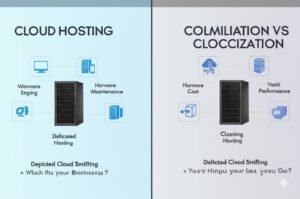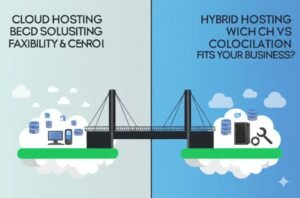When it comes to managing your business’s IT infrastructure, the options are vast and sometimes overwhelming. You’ve probably heard about cloud hosting and colocation, but do you know how they compare? Well, let’s talk about it, and I’ll share some insights that might help you choose the right path for your needs.
You see, choosing between cloud hosting and colocation is like deciding between renting a fully-furnished apartment or buying your own home. Both have their advantages, but they also come with different responsibilities, costs, and flexibility. And trust me, picking the wrong one can lead to a lot of frustration down the road. So, let’s break down the differences, the benefits, and the challenges of each to give you a better idea of which one could work best for your business.
Key Points to Remember:
- Cloud Hosting: Ideal for flexibility and ease of scaling.
- Colocation: This gives you more control over hardware but requires more management.
- Hybrid Solutions: Many businesses opt for a mix of both to balance flexibility and control.
Cloud Hosting: The Easy Road to Scalable IT
Let’s start with cloud hosting. Imagine it like ordering a meal at a restaurant—you only pay for what you use, and someone else does all the cooking, serving, and cleaning up afterward. Cloud hosting works the same way. Providers like AWS, Google Cloud, and Microsoft Azure manage the servers and infrastructure. You rent space on their servers, and you can scale your resources up or down based on your needs.
This model is perfect for businesses that don’t want to deal with the hassles of managing physical hardware. You can access your data and applications from anywhere with an internet connection, which is why cloud hosting has become so popular, especially with remote teams. It’s also more affordable upfront because you don’t have to invest in physical servers or data centers.
The main benefit of cloud hosting? Flexibility. You can grow your infrastructure as your business grows, and you only pay for what you need at the moment. But, of course, this flexibility comes with a cost. Over time, as your business expands, cloud costs can creep up, and the monthly fees might surprise you.
Colocation: Control at the Cost of Convenience
Now, let’s talk about colocation. This one’s a bit different. Colocation is like buying your own house—you invest in the property (the servers and hardware), but you rent out space in someone else’s data center to store it. The data center takes care of the power, cooling, security, and internet connectivity, but you’re responsible for your own hardware, maintenance, and management.
Colocation offers a lot more control than cloud hosting. You own the equipment, which means you can configure it exactly how you want. Plus, if you have security or regulatory requirements, colocation might be your best option because you have physical control over your hardware.
However, managing your own hardware can be a headache. You’ll need a team to handle maintenance, upgrades, and troubleshooting. And if you’re in a rush to scale, adding new servers or upgrading equipment can take time and money. Still, if you’re running a large, stable operation and need complete control over your setup, colocation might be the way to go.
Key Differences: Cloud Hosting vs Colocation
Let’s take a step back and compare the two head-to-head to really get to the heart of it. Below is a table that breaks down the main differences between cloud hosting and colocation:
| Feature | Cloud Hosting | Colocation |
|---|---|---|
| Ownership | Renting space on provider’s servers | You own the servers and hardware |
| Scalability | Very scalable, pay-as-you-go | Limited by your hardware and capacity |
| Maintenance | Managed by the provider | You manage your own hardware |
| Upfront Costs | Low upfront cost, pay monthly | High upfront cost for hardware |
| Control | Limited control over physical infrastructure | Full control over your hardware |
The Hybrid Approach: Combining the Best of Both Worlds
If you’re like most businesses, you might find that the best solution isn’t choosing between cloud hosting or colocation, but using both in a hybrid model. In fact, many organizations today rely on a combination of cloud and colocation to get the best of both worlds.
With a hybrid solution, you can store sensitive data and critical infrastructure in your colocation space while leveraging cloud services for flexible, on-demand computing power. This is a great option for businesses with fluctuating resource demands but still requiring a secure, reliable base for sensitive applications and data.
It’s like living in a house but also having access to a flexible, temporary space (cloud hosting) when you need it. The hybrid approach provides a balance of control, scalability, and cost-efficiency that might be exactly what your business needs.
Pros and Cons of Cloud Hosting and Colocation
So, now that we’ve looked at the details, let’s talk about the advantages and challenges of each:
Pros of Cloud Hosting:
- Scalability: You can easily scale up or down depending on your needs.
- Lower upfront costs: No need to buy expensive hardware or set up a physical data center.
- Ease of Use: Everything is managed for you, which frees up your team to focus on other tasks.
- Global Accessibility: Cloud hosting allows you to access your data from anywhere.
Cons of Cloud Hosting:
- Cost Over Time: While initial costs are low, recurring monthly fees can add up as your business grows.
- Less Control: You don’t own the hardware, so customization options are limited.
- Data Security: While cloud providers have strong security measures, you’re still trusting someone else with your data.
Pros of Colocation:
- Complete Control: You own the equipment, so you can customize it as you see fit.
- Security: If you have sensitive data, you have more control over its security.
- Cost Savings in the Long Run: While the initial investment is higher, colocation can be more cost-effective as your infrastructure grows.
Cons of Colocation:
- Upfront Costs: You need to purchase your own hardware, which requires a significant investment.
- Maintenance: You’re responsible for maintaining your hardware and software.
- Limited Scalability: Expanding your infrastructure can take time and money.
Cloud Hosting vs Colocation: Which Is Right for You?
When it comes down to it, choosing between cloud hosting and colocation depends on your business’s specific needs. If you’re a growing startup or have fluctuating demands, cloud hosting is a great option because it offers flexibility without a heavy upfront investment. However, if you’re an established business with the resources to manage your own infrastructure and need greater control, colocation could be the best fit.
Conclusion
In the end, there’s no one-size-fits-all answer. Both cloud hosting and colocation offer unique advantages, and many businesses opt for a combination of both, depending on their needs. Whether you’re looking for flexibility, control, or cost savings, the right solution for your business is out there.
FAQs
1. What is the main difference between cloud hosting and colocation? Cloud hosting involves renting space on the provider’s servers, while colocation involves placing your own hardware in a third-party data center.
2. Which option is more cost-effective? Cloud hosting usually has lower upfront costs, but colocation can be more cost-effective in the long run if you have the resources to manage it.
3. Is cloud hosting more scalable than colocation? Yes, cloud hosting offers more scalability because you can adjust your resources based on demand without worrying about physical hardware.
4. Can I use both cloud hosting and colocation together? Yes, many businesses use a hybrid solution that combines both for optimal control and scalability.
5. Does colocation offer better security than cloud hosting? Colocation can offer better security if you need complete control over your hardware, but cloud providers also have strong security measures.
6. How much control do I have with cloud hosting? With cloud hosting, you have limited control over the physical hardware, but you can manage your virtual environment.
7. What are the risks of using cloud hosting? The main risks include potential security concerns and the cost of scaling as your business grows.


